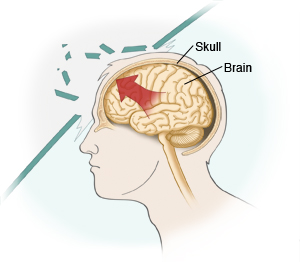Head Injury with Sleep Monitoring (Adult)

You have had a head injury and the injury does not appear serious at this time. Symptoms of a more serious problem, such as mild brain injury (concussion), bruising or bleeding in the brain, may appear later. For this reason, you and someone caring for you will need to watch for the symptoms listed below. Once at home, be sure to follow any care instructions you have been given.
Home care
Watch for the following warning signs and symptoms:
- Headache
- Nausea or vomiting
- Dizziness
- Sensitivity to light or noise
- Unusual sleepiness or grogginess
- Trouble falling asleep
- Personality changes
- Vision changes
- Memory loss
- Confusion
- Trouble walking or clumsiness
- Loss of consciousness (even for a short time)
- Changes in speech or slurring of speech
- Inability to be awakened
- Stiff neck
- Weakness or numbness in any part of the body
- Seizures
If you develop any of these symptoms, seek emergency medical care right away. If none of these symptoms are noted during the first 24 hours, keep watching for symptoms for the next day or so. Ask your provider if someone should stay with you during this time.
General care
- If you were prescribed medicines for pain, use them as directed. Note: Do not use other pain medicines without checking with your provider first.
- To help reduce swelling and pain, apply a cold source to the injured area for up to 20 minutes at a time. Do this as often as directed. Use a cold pack or bag of ice wrapped in a thin towel. Never apply a cold source directly to the skin.
- If you have cuts or scrapes as a result of your injury, care for them as directed.
- For the next 24 hours (or longer, if instructed):
-
- Do not drink alcohol or use sedatives or other medicines that make you sleepy.
- Do not drive or operate machinery.
- Do not do anything strenuous, such as heavy lifting or straining.
- Do not return to sports or other activity that could result in another head injury.
Follow-up care
Follow up with your healthcare provider, or as directed. If imaging tests were done, they will be reviewed by a doctor. You will be told the results and any new findings that may affect your care.
When to seek medical advice
Call your healthcare provider right away if any of these occur:
- Pain does not get better or worsens
- New or increased swelling or bruising
- Fever of 100.4°F (38°C) or higher, or as directed by your provider
- Redness, warmth, bleeding, or drainage from the injured area
- Any depression or bony abnormality in the injured area
- Fluid drainage or bleeding from the nose or ears